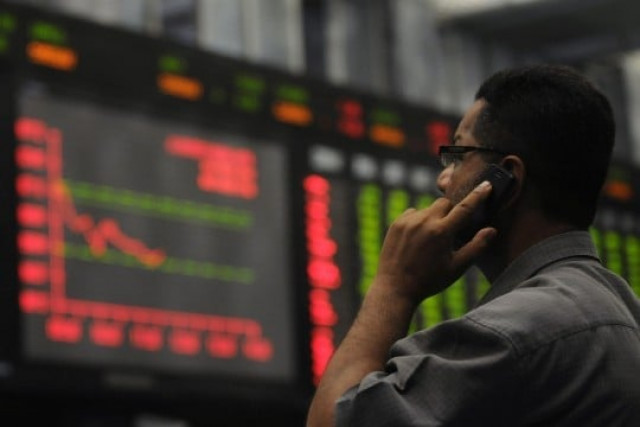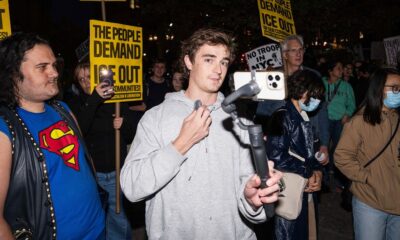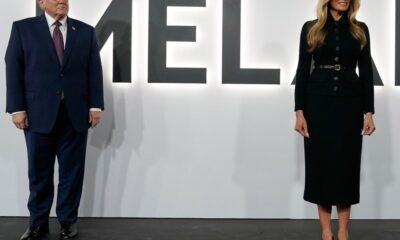Business
Donald Trump to levy $100,000 H-1B visa application fee; overhaul aimed at protecting American workers: Report – The Times of India

The US administration plans a major change to the H-1B visa programme, with President Donald Trump expected to sign a proclamation Friday imposing a $100,000 application fee, according to a White House official, quoted in a Bloomberg report.The order is intended to curb misuse of the visa category and its perceived impact on American jobs. Entry under the programme would require the hefty payment, the official said (anonymously), while the Labour Secretary will be directed to begin revising H-1B wage rules to protect US workers from wage suppression.The technology sector, a heavy user of H-1B visas, is likely to feel the sharpest effects. The White House argues the new measures will bolster the integrity of the system and reduce exploitation. A document reviewed by Bloomberg News describes the replacement of American workers with lower-cost foreign labour as a national-security issue that discourages domestic STEM careers.It remains unclear whether the $100,000 fee will be added to or replace existing charges. Current costs include a $215 lottery registration and a $780 Form I-129 filing.The programme grants 85,000 visas annually through a lottery that some firms allegedly game by submitting multiple applications, often to hire lower-paid staff via staffing and outsourcing companies.This move aligns with broader immigration fee hikes for work permits, asylum requests and other services, intended to fund detention facilities, expanded border barriers and additional enforcement personnel.
Business
No more misleading ads: Supreme Court makes self-declaration mandatory before every advertisement – The Times of India

Targeting to safeguard consumers against misleading advertisements, the Supreme Court, on 07.05.2024, ordered that no advertisement shall be posted, broadcast, aired or shown without a prior self-statement by the advertiser purporting that the advertisement is not misleading. The Court relied on its constitutional authority to impose what it considered as the fundamental right to health and informed consumer choice. The order was passed while hearing the contempt proceedings against Patanjali over the publication of misleading advertisements, but the Court used the occasion to address the larger systemic problem of deceptive health and FMCG advertisements across India.The order was passed by a Bench of Justice Hima Kohli and Justice Ahsanuddin Amanullah in Indian Medical Association v. Union of India, a continuing matter concerning misleading medical and health claims in advertisements.The Court clarified that the current regulatory regime did not help to stem the spread of fraudulent promotions and thus the judiciary had to step in to “fill the vacuum”.Background:The writ petition was originally filed by the Indian Medical Association (IMA), raising concerns about misleading advertisements relating to medical treatments and health products. During the course of hearings, the Court expanded the scope of the issue to scrutinize the whole ecosystem of advertising regulation in India, the role of the Ministry of AYUSH, Ministry of Health, Government of Consumer Affairs, Government of Information and Broadcasting and state licensing authorities.The case also examined whether complaints received under the Grievances Against Misleading Advertisements (GAMA) portal were actually being acted upon and whether the Central Consumer Protection Authority (CCPA) guidelines were being meaningfully enforced.Other claims that were brought before the immediate proceedings included the allegations that some parties still continued to release deceptive advertisements despite earlier orders offered by the Supreme Court. Apologies were made publicly. Nevertheless, the Court became entangled into a bigger structural problem why deceptive advertisements still flourish even when several laws had already been enacted. Court’s Concern and AnalysisThe Bench examined affidavits of various ministries and discovered a very unsatisfactory enforcement image. Statistics showed that there was a considerable number of complaints that were received over the years, but very few cases led to any real action.The Court observed:“It is said that the consumer is a king. There has to be some answerability from some agency… Consumer should have a remedy. If there is a system in place, that should work.”The Court stressed that consumers cannot be expected to “run from pillar to post” in search of relief and that the system must provide a clear and effective remedy.The Court also noted that despite having statutory protections under the Drugs and Magic Remedies (Objectionable Advertisements) Act, 1954, the Drugs and Cosmetics Act, 1940, the Consumer Protection Act, the Food Safety and Standards Act, misleading advertisements continued to circulate “with little or no accountability”.The Court observed:“We are of the opinion that when the C.P. Act, 1986 has dedicated an entire chapter to the Central Consumer Protection Authority (Chapter III) that contemplates establishment of a Central Consumer Protection Authority by the Central Government to regulate matters relating to violation of the rights of the consumers, unfair trade practices and false/misleading advertisements which are prejudicial to the interest of the public and consumers and to promote, protect and enforce the rights of the consumers as a class, the said provisions ought to be used with much more vigour and intensity.” Another eye-catching section of the ruling concerns the recommendations of the celebrities. The Court provided a warning that celebrities and influencers cannot get off the hook of promotion of misleading goods.The Bench stated:“Advertisers/advertising agencies and endorsers are equally responsible for issuing false and misleading advertisements.”It pointed out that the influence of the recommendation of celebrities on customers is strong and thus should be subjected to due diligence. The Court relied heavily on the CCPA Guidelines, particularly Guideline 13, which requires due diligence before endorsement.The Court noted that there are already existing guidelines; such that the endorsers must have a sufficient knowledge or experience with the product and that the advert is not a misleading one- however these guidelines are being applied with a lack of seriousness. The Court also framed the issue not merely as consumer protection, but as a constitutional matter linked to the right to health.It held:“It is deemed appropriate to invoke the powers vested in this Court under Article 32 of the Constitution of India for the enforcement of the fundamental right to health that encompasses the right of a consumer to be made aware of the quality of products being offered for sale.”The Bench concluded that the absence of an effective enforcement mechanism created a legal vacuum that the Court was duty-bound to address.To plug this gap, the Court issued one of its most significant directions and described it as a “tide over measure” until a stronger enforcement structure is implemented.It directed:“Henceforth, before an advertisement is printed/aired/displayed, a Self-declaration shall be submitted by the advertiser/advertising agency…”. The Court said that the declaration has to affirm that the advertisement does not breach the law and neither contains false or misleading statements. The Court used the framework of Rule 7 of the Cable Television Rules that forbids advertisements that claim miraculous or supernatural properties, exploit social evils, mislead consumers, violate morality or decency, promote illegal substances, degrade women or communitiesIn order to operationalize this system, the Court directed the following: –
- Advertisements for TV and broadcasting must upload declarations on the Broadcast Sewa Portal
- A new dedicated portal must be created within 4 weeks for print and internet advertisements
The Court ordered:“No advertisements shall be permitted to be run… without uploading the self-declaration.” “Immediately after the portal is activated, all ads in press/ print media, the advertisers shall file the self-declaration before issuing any advertisements in the print media,” the order added.It further clarified:“The above directions shall be treated as the law declared by this Court under Article 141 of the Constitution of India.”This means the ruling has binding nationwide effect.The Court also ruled that an administrative letter issued by the Ministry of AYUSH in 2023, which effectively paused enforcement of Rule 170 of the Drugs and Cosmetics Rules, could not override a statutory rule. It directed the Ministry to immediately withdraw the letter, observing that executive instructions cannot suspend a law that remains in force.The Court was further concerned that in many cases, complaints made by consumers were simply shuffled among various departments without taking any action on the matter, leaving hapless citizens without any clue as to what happened in the end regarding the complaints.Upon noticing the extent of this lack, the Court directed the Ministry of Health and the Food Safety and Standards Authority of India (FSSAI) to file detailed affidavits disclosing complaints received since 2018 and action taken in cases involving misbranded food, misleading food advertisements and substandard products. The Bench emphasized that FSSAI is empowered to act suo motu and cannot wait for complaints.The Court also examined government data showing that between 2018 and 2024, over 1600 complaints were received against broadcasters, yet enforcement action was taken in only a fraction of cases. The Bench described the enforcement record as deeply unsatisfactory.Finally, the Supreme Court highlighted that the misleading advertisements are not a minor regulatory issue but a direct consumer rights concern inherently connected with the health of people and trust in society. The Court further stressed that the whole set of statutes, rules, and guidelines have been modelled in such a manner that they would benefit consumers and ensure that consumers have unequivocal information on what they are buying particularly in the very sensitive area of food and health.In simple words, the Court has drawn a line that the advertisements which can affect the health issues and trust of people will no longer be treated as innocent exaggerations. The Supreme Court has shifted the priorities to the consumer by making advertisers, endorsers and the regulators responsible as well. The decision gives an indication that the right to health, in the current market, extends to the right to truthful information and this is a promise that should now be put into practice.Case Title: Indian Medical Association v. Union of India | W.P.(C) No. 645/2022(Vatsal Chandra is a Delhi-based Advocate practicing before the courts of Delhi NCR.)
Business
Jaguar Land Rover losses deepen after crippling cyber attack

Jaguar Land Rover has plunged to a £310m pre-tax loss in its third quarter, as the luxury car manufacturer continues to grapple with the financial repercussions of a major cyber attack last autumn.
It marks a significant downturn from the £523m profit reported a year earlier.
The cyber incident alone incurred an additional £64m in costs, contributing significantly to the downturn.
The attack forced a five-week production halt across the company’s UK factories from 1 September.
It severely impacted sales volumes and caused revenues to tumble by 39 per cent year-on-year to £4.5bn in the final three months of 2023.
Production only returned to normal levels in mid-November.
Compounding those losses were ongoing US tariffs, the planned discontinuation of older Jaguar models ahead of new launches, and deteriorating market conditions in China.
Despite the setbacks, the group anticipates a marked improvement in its performance during its final quarter.
New JLR chief executive PB Balaji, who took over from former boss Adrian Mardell in November, said it was a “challenging quarter for JLR with performance impacted by the production shutdown we initiated in response to the cyber incident, the planned wind down of legacy Jaguar and US tariffs”.
He added: “Thanks to the commitment of our dedicated teams, we returned vehicle production to normal levels by mid-November, and we are focused on building our business back stronger.
“While the external environment remains volatile, we expect performance to improve significantly in the fourth quarter and we have clear plans to manage global challenges.”
JLR’s latest losses come after it slumped into the red by £485m in the previous three months following a 24 per cent drop in revenues, bringing its losses for the year to date to £444 against profits of £1.6bn a year earlier.
It previously booked £196m of costs linked to the cyber attack in its second quarter.
It is understood this included the cost of hiring consultants to help it deal with the incident, but not the impact of lost sales and other costs, such as increases in engineering costs.
Business
Retailer Quiz becomes latest firm to hit the wall with 109 jobs axed

Fashion retailer Quiz has become the latest firm to collapse into administration with 109 head office and warehouse staff being made redundant and hundreds more at risk.
Administrators Interpath said the chain’s 40 stores across the UK and seven concessions in Ireland will continue to trade while they look at options for the firm but its website will shut.
They said 109 redundancies are being made across the firm’s head office in Glasgow and its warehouse and distribution centre in Bellshill, Lanarkshire.
Interpath confirmed that Quiz concessions in New Look and Matalan stores in the UK are not included in the administration and remain unaffected.
Quiz employs 565 workers in total.
It marks the second time Quiz has fallen into administration in a year, having collapsed in February 2025 before immediately being bought in a so-called pre-pack deal by a subsidiary of the founding Ramzan family.
The deal at the time saw Orion buy a raft of assets, including the Quiz brand and 42 of its shops, but 23 stores were shut in a move affecting 200 jobs.
Alistair McAlinden, head of Interpath in Scotland and joint administrator, said: “With Quiz the latest retailer to fall into administration, there’s no doubt it’s been a tough start to 2026 for the UK high street.
“It’s our intention to continue to trade all stores and the concessions in Ireland as a going concern for as long as we can while we assess options for the business.”
Geoff Jacobs, fellow joint administrator and managing director at Interpath, added: “Any parties with an interest in acquiring the stock, store operations and infrastructure of Quiz should contact us as a matter of urgency.
“We are ensuring that those employees impacted by redundancy are provided with all available support at this difficult time.”
Interpath said Quiz had suffered amid tough trading conditions over the past year, with sales weaker than expected over the crucial Christmas season.
“In addition, Quiz had to contend with strong economic headwinds including changing consumer habits, cost pressures from business rates and the recent increases to employment costs,” it added.
The firm looked at options to secure its future, including additional funding, but efforts failed, according to Interpath.
The administrators confirmed gift cards and credit notes will no longer being accepted, while those with online returns will need to do so in a Quiz store for exchange, but cannot receive cash or card refunds.
Shoppers who have made returns online but not received the money will “regrettably, not receive a refund from Quiz”.
Customers should contact the provider of the credit or debit card which was used for the payment and ask for assistance.
-

 Entertainment1 week ago
Entertainment1 week agoClaire Danes reveals how she reacted to pregnancy at 44
-

 Sports1 week ago
Sports1 week agoCollege football’s top 100 games of the 2025 season
-

 Politics1 week ago
Politics1 week agoTrump vows to ‘de-escalate’ after Minneapolis shootings
-

 Sports1 week ago
Sports1 week agoTammy Abraham joins Aston Villa 1 day after Besiktas transfer
-

 Business1 week ago
Business1 week agoPSX witnesses 6,000-point on Middle East tensions | The Express Tribune
-

 Entertainment1 week ago
Entertainment1 week agoK-Pop star Rosé to appear in special podcast before Grammy’s
-

 Tech1 week ago
Tech1 week agoThe Surface Laptop Is $400 Off
-

 Sports1 week ago
Sports1 week agoAaron Judge named cover athlete for MLB The Show 26















